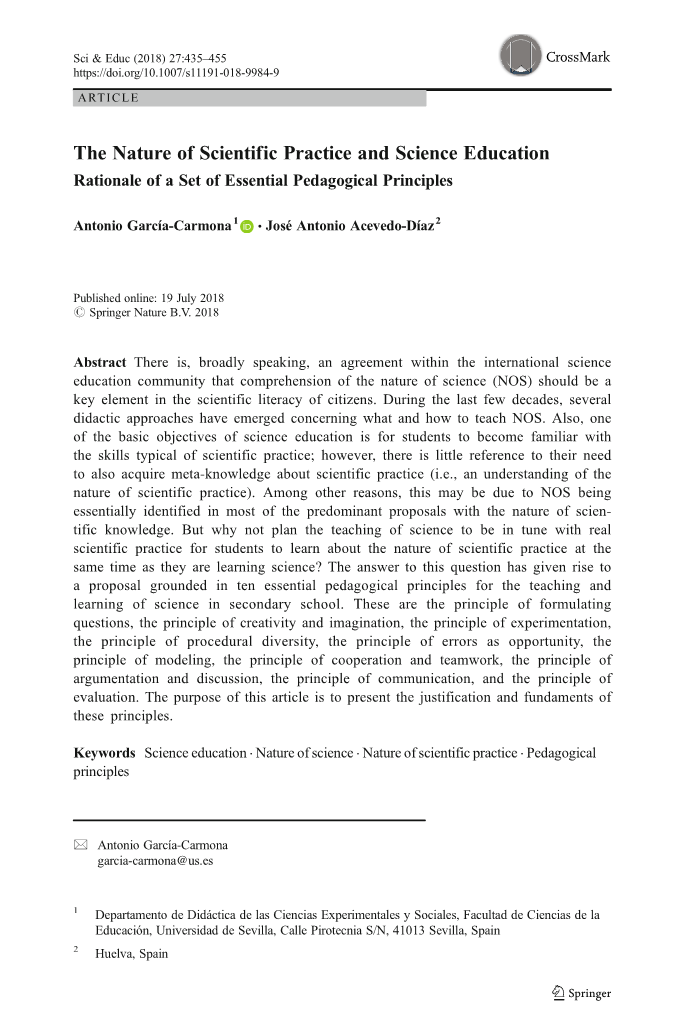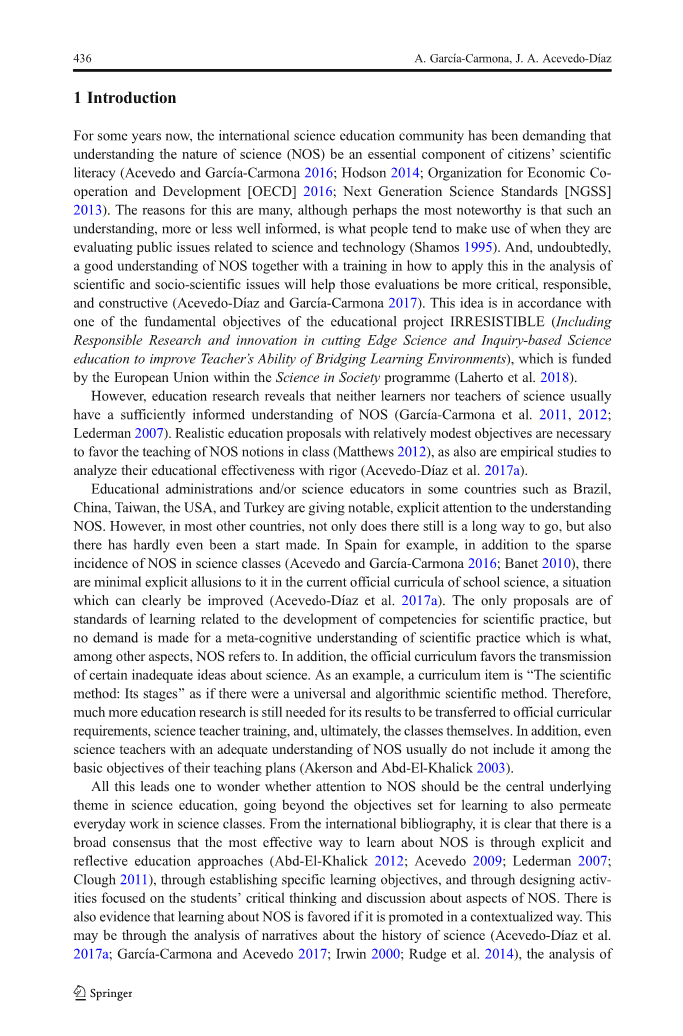本科毕业设计(论文)
外文翻译
The Nature of Scientific Practice and Science Education
-----Rationale of a Set of Essential Pedagogical Principles
作者:Antonio Garciacute;a-Carmona, Joseacute; Antonio Acevedo-Diacute;az
国籍:Spain
出处:Science amp; Education
原文正文:
Abstract There is, broadly speaking, an agreement within the international science education community that comprehension of the nature of science (NOS) should be a key element in the scientific literacy of citizens. During the last few decades, several didactic approaches have emerged concerning what and how to teach NOS. Also, one of the basic objectives of science education is for students to become familiar with the skills typical of scientific practice; however, there is little reference to their need to also acquire meta-knowledge about scientific practice (i.e., an understanding of the nature of scientific practice). Among other reasons, this may be due to NOS being essentially identified in most of the predominant proposals with the nature of scien-tific knowledge. But why not plan the teaching of science to be in tune with real scientific practice for students to learn about the nature of scientific practice at the same time as they are learning science? The answer to this question has given rise to a proposal grounded in ten essential pedagogical principles for the teaching and learning of science in secondary school. These are the principle of formulating questions, the principle of creativity and imagination, the principle of experimentation, the principle of procedural diversity, the principle of errors as opportunity, the principle of modeling, the principle of cooperation and teamwork, the principle of argumentation and discussion, the principle of communication, and the principle of evaluation. The purpose of this article is to present the justification and fundaments of these principles.
Keywords Science education . Nature of science . Nature of scientific practice . Pedagogical principles
- Antonio Garciacute;a-Carmona garcia-carmona@us.es
- Departamento de Didaacute;ctica de las Ciencias Experimentales y Sociales, Facultad de Ciencias de la Educacioacute;n, Universidad de Sevilla, Calle Pirotecnia S/N, 41013 Sevilla, Spain
- Huelva, Spain
436 A. Garciacute;a-Carmona, J. A. Acevedo-Diacute;az
1 Introduction
For some years now, the international science education community has been demanding that understanding the nature of science (NOS) be an essential component of citizensrsquo; scientific literacy (Acevedo and Garciacute;a-Carmona 2016; Hodson 2014; Organization for Economic Co-operation and Development [OECD] 2016; Next Generation Science Standards [NGSS] 2013). The reasons for this are many, although perhaps the most noteworthy is that such an understanding, more or less well informed, is what people tend to make use of when they are evaluating public issues related to science and technology (Shamos 1995). And, undoubtedly, a good understanding of NOS together with a training in how to apply this in the analysis of scientific and socio-scientific issues will help those evaluations be more critical, responsible, and constructive (Acevedo-Diacute;az and Garciacute;a-Carmona 2017). This idea is in accordance with one of the fundamental objectives of the educational project IRRESISTIBLE (Including Responsible Research and innovation in cutting Edge Science and Inquiry-based Science education to improve Teacherrsquo;s Ability of Bridging Learning Environments), which is funded by the European Union within the Science in Society programme (Laherto et al. 2018).
However, education research reveals that neither learners nor teachers of science usually have a sufficiently informed understanding of NOS (Garciacute;a-Carmona et al. 2011, 2012; Lederman 2007). Realistic education proposals with relatively modest objectives are necessary to favor the teaching of NOS notions in class (Matthews 2012), as also are empirical studies to analyze their educational effectiveness with rigor (Acevedo-Diacute;az et al. 2017a).
Educational administrations and/or science educators in some countries such as Brazil, China, Taiwan, the USA, and Turkey are giving notable, explicit attention to the understanding NOS. However, in most other countries, not only does there still is a long way to go, but also there has hardly even been a start made. In Spain for example, in addition to the sparse incidence of NOS in science classes (Acevedo and Garciacute;a-Carmona 2016; Banet 2010), there are minimal explicit allusions to it in the current official curricula of school science, a situation which can clearly be improved (Acevedo-Diacute;az et al. 2017a). The only proposals are of standards of learning related to the development of competencies for scientific practice, but no demand is made for a meta-cognitive understanding of scientific practice which is what, among other aspects, NOS refers to. In addition, the official curriculum favors the transmission of certain inadequate ideas about science. As an example, a curriculum item is BThe scientific method: Its stages^ as if there were a universal and algorithmic scientific method. Therefore, much more education research is still needed for its results to be transferred to
剩余内容已隐藏,支付完成后下载完整资料
英语原文共 21 页,剩余内容已隐藏,支付完成后下载完整资料
资料编号:[276777],资料为PDF文档或Word文档,PDF文档可免费转换为Word
课题毕业论文、外文翻译、任务书、文献综述、开题报告、程序设计、图纸设计等资料可联系客服协助查找。




